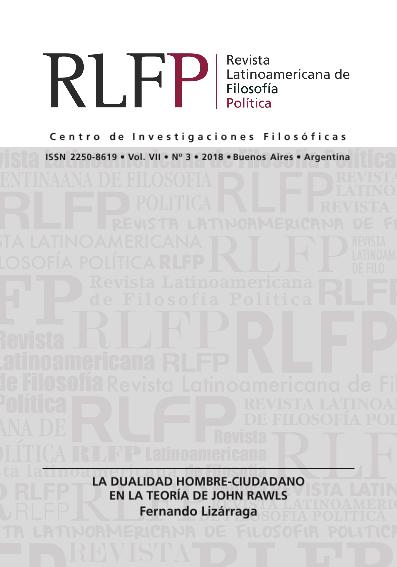Mostrar el registro sencillo del ítem
dc.contributor.author
Lizárraga, Fernando Alberto

dc.date.available
2019-11-25T20:43:22Z
dc.date.issued
2018-10
dc.identifier.citation
Lizárraga, Fernando Alberto; La dualidad hombre-ciudadano en la teoría de John Rawls; Universidad de Buenos Aires. Centro de Investigaciones Filosóficas; Revista Latinoamericana de Filosofía Política; 7; 3; 10-2018; 1-34
dc.identifier.issn
2250-8619
dc.identifier.uri
http://hdl.handle.net/11336/89748
dc.description.abstract
La dualidad hombre-ciudadano constituye uno de los elementos fundacionales del liberalismo. Desde la perspectiva de Gerald A. Cohen, esta escisión representa el desacuerdo fundamental entre el socialismo y el igualitarismo liberal de John Rawls. Así, en clave coheniana, analizamos en primer término algunos rasgos generales del problema para luego señalar cómo impacta en la responsabilidad por las preferencias. En segundo lugar, en función de las dos partes de la estructura básica, examinamos cómo el primer principio de justicia –en tanto esencia constitucional– se vincula con los ciudadanos como “cuerpo colectivo”, mientras que el segundo principio –ya sin fuerza de ley– es asumido por los individuos y asociaciones particulares. Por último, en el marco de la tensión entre las motivaciones de los ciudadanos y los individuos, sostenemos que el mínimo social prescripto por Rawls puede ser insuficiente para asegurar la igualdad equitativa de las libertades políticas, la fraternidad y el respeto propio, dadas las desigualdades permitidas por el principio de diferencia.
dc.description.abstract
The dualism man-citizen represents one of the founding features of liberalism. From the perspective of Gerald A. Cohen, this division embodies the fundamental disagreement between socialism and John Rawls’s liberal egalitarianism. Thus, adopting Cohen’s viewpoint, I first look into some general traits of this case and then go on to point out how it has an impact on the responsibility for preferences. Secondly, taking into account the two parts of the basic structure, I analyze how the first principle of justice –as a constitutional essential– is linked to citizens as a “collective body”, whereas the second principle –lacking force of law– is taken upon by particular individuals and associations. Lastly, in view of the tensions between the motives of citizens and individuals, I hold that the social minimum prescribed by Rawls might be insufficient to secure the fair equality of political liberties, fraternity, and self-respect, given the inequalities allowed by the difference principle.
dc.format
application/pdf
dc.language.iso
spa
dc.publisher
Universidad de Buenos Aires. Centro de Investigaciones Filosóficas
dc.rights
info:eu-repo/semantics/openAccess
dc.rights.uri
https://creativecommons.org/licenses/by-nc-sa/2.5/ar/
dc.subject
CIUDADANÍA
dc.subject
LIBERALISMO
dc.subject
SOCIALISMO
dc.subject
PRINCIPIO DE DIFERENCIA
dc.subject
RAWLS
dc.subject.classification
Otras Ciencia Política

dc.subject.classification
Ciencia Política

dc.subject.classification
CIENCIAS SOCIALES

dc.title
La dualidad hombre-ciudadano en la teoría de John Rawls
dc.type
info:eu-repo/semantics/article
dc.type
info:ar-repo/semantics/artículo
dc.type
info:eu-repo/semantics/publishedVersion
dc.date.updated
2019-10-23T21:40:19Z
dc.journal.volume
7
dc.journal.number
3
dc.journal.pagination
1-34
dc.journal.pais
Argentina

dc.journal.ciudad
Ciudad Autónoma de Buenos Aires
dc.description.fil
Fil: Lizárraga, Fernando Alberto. Universidad Nacional del Comahue. Instituto Patagónico de Estudios de Humanidades y Ciencias Sociales. Consejo Nacional de Investigaciones Científicas y Técnicas. Centro Científico Tecnológico Conicet - Patagonia Norte. Instituto Patagónico de Estudios de Humanidades y Ciencias Sociales; Argentina
dc.journal.title
Revista Latinoamericana de Filosofía Política
dc.relation.alternativeid
info:eu-repo/semantics/altIdentifier/url/http://rlfp.org.ar/la-dualidad-hombre-ciudadano/
dc.relation.alternativeid
info:eu-repo/semantics/altIdentifier/url/http://filosofia.net/bdf/rhm/lfp.htm
Archivos asociados
